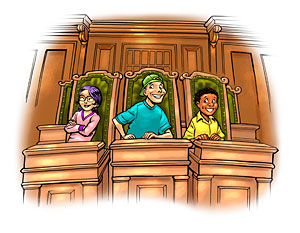

Democracy in Montréal

Activity to prepare in class
Democracy in Montréal
This activity presents several concepts associated with democracy in Montréal: how citizens exercise their power, the different political decision-making bodies and a few of the services for which the City is responsible.
Length
About 60 minutes
For the students
Democracy in Montréal
How to explain the municipal political system to the students? This one-page document includes a few questions for the students (for example: an explanation of the conditions for voting), as well as a map of the Montréal boroughs.
If you would like to know which borough your school is in, you check on the maps on the City of Montréal website or find out at an Accès Montréal office.
Who makes the decisions in Montréal?
On January 1st, 2002, a newly merged City of Montréal encompassed all 28 municipalities on the island of Montréal. The Québec government allowed some municipalities to de-merge in response to the wishes expressed by citizens in referendums held in June, 2004.
Since January 1st, 2006, the Island includes 16 municipalities : Montréal, Beaconsfield, Baie d'Urfé, Côte-Saint-Luc, Hampstead, Montréal-Ouest, Dollard-Des Ormeaux, Dorval, Kirkland, L’Île-Dorval, Sainte-Anne-de-Bellevue, Mont-Royal, Senneville, Pointe-Claire, Montréal-Est, Westmount.
The City of Montréal has three decision-making bodies:
The agglomeration council
This is a new body, headed by the mayor of Montréal. The council is made up of 31 elected officials from the 16 cities on the island of Montréal, that is, the mayor of Montréal, 15 Montréal city councillors and 15 mayors and officials from the reconstituted cities.
The agglomeration council oversees shared services for all Island municipalities, such as the police, the fire department and the nature parks.
The municipal council
This is made up of 65 elected officials: the mayor of Montréal, the 19 borough mayors and 45 city councillors.
The city council is responsible for overseeing municipal activities: finances, strategic planning and major policy orientations for city planning, culture, recreation and economic and community development.
It meets once a month in the council room at City Hall. Meetings are open to the public.
The borough councils
There are 19 boroughs in the City of Montréal. Each borough is represented by a borough mayor and by between four and six city and borough councilors. The borough councilors sit only on the borough council, while the city councilors also sit on the municipal council.
Borough councils manage the services that touch citizens directly: household garbage collection, park management and local sports, cultural or leisure facilities and local roads, to name but a few.
Borough councils meet once a month. The sessions are open to the public.
Municipal services for children
The core mission of a city is to ensure excellent municipal services for citizens and thus to create a secure and pleasant environment in which economic, social and cultural development can flourish.
Do municipal services pay attention to children? Yes, and many young people probably already use them. Among these services are local libraries, summer and other holiday camps, Maisons de la culture, various activities that take place in the parks, the Fête des enfants and the Fête des neiges. Children may also be interested in other things, such as recycling, community gardens or Ecocentres.
![]() Next Activity - Special election: Five mayors on the campaign trail!
Next Activity - Special election: Five mayors on the campaign trail!
For more information …
- Visit the virtual exhibition Democracy in Montréal, which includes the activity Citizens of Tomorrow.
- Visit the official portal for the City of Montréal. There you will find a section on Elections (Search alphabetically, A to Z)
